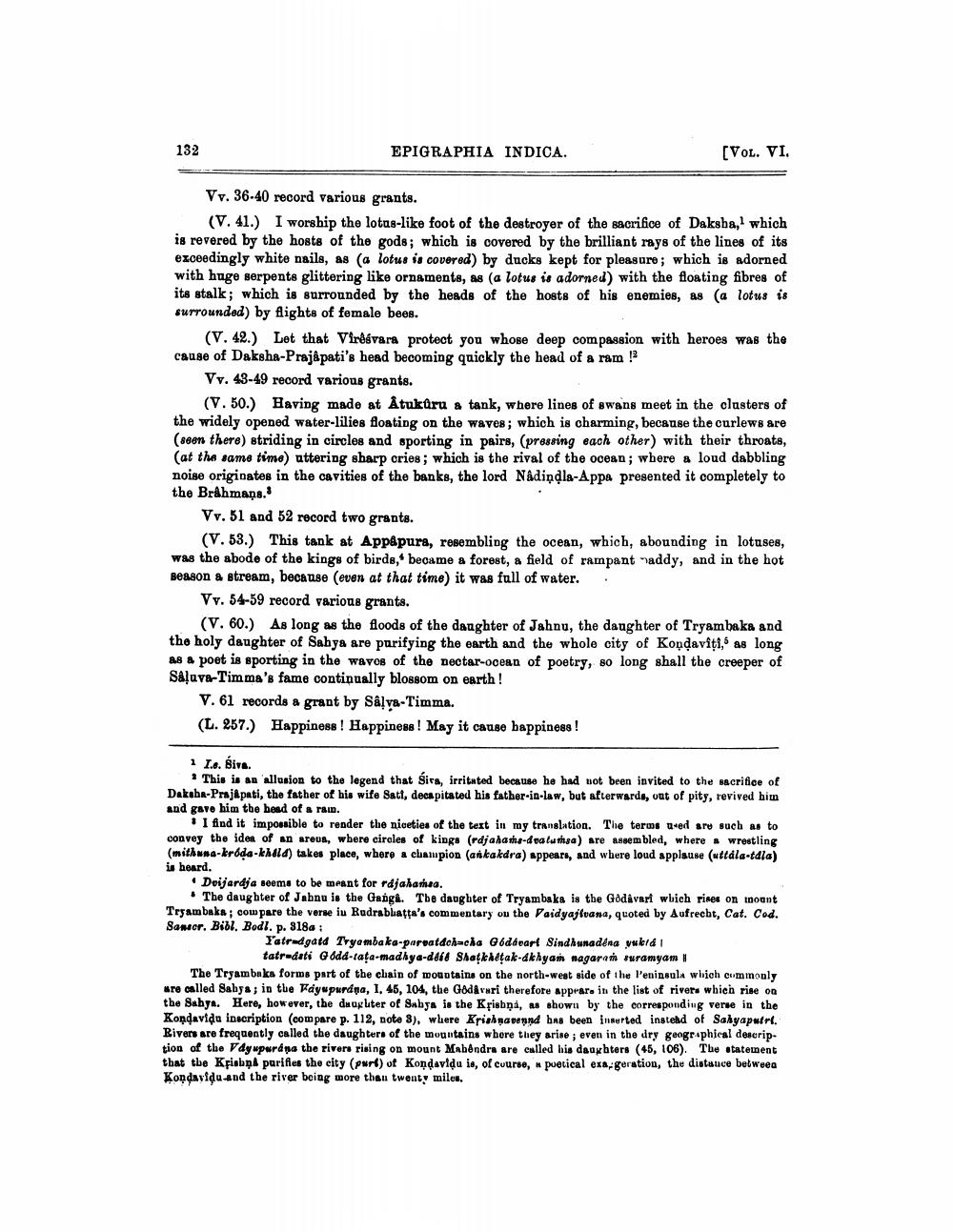________________
132
EPIGRAPHIA INDICA.
[Vol. VI.
Vv. 36-40 record various grants.
(V. 41.) I worship the lotus-like foot of the destroyer of the sacrifice of Daksba,' which is revered by the hosts of the gods; which is covered by the brilliant rays of the lines of its exceedingly white nails, as (a lotus is covered) by ducks kept for pleasure, which is adorned with huge serpente glittering like ornaments, as (a lotus is adorned) with the floating fibres of its stalk; which is surrounded by the heads of the hosts of his enemies, as (a lotus is surrounded) by flights of female bees.
(V. 42.) Let that Virdsvara protect you whose deep com passion with heroes was the cause of Daksha-Prajapati's head becoming quickly the head of a ram !
Vv. 43-49 record various grants.
(V. 50.) Having made at Åtukuru & tank, where lines of swans meet in the clusters of the widely opened water-lilies floating on the waves; which is charming, because the curlews are (seen there) striding in circles and sporting in pairs, (pressing each other) with their throats, (at the same time) uttering sharp cries, which is the rival of the ocean; where a loud dabbling noise originates in the cavities of the banks, the lord Nadiņdla-Appa presented it completely to the Brahmans.
Vv. 51 and 52 record two grants.
(V. 53.) This tank at App&pura, resembling the ocean, which, abounding in lotuses, was the abode of the kings of birds, became a forest, a field of rampant naddy, and in the hot Beason a stream, because even at that time, it was full of water. .
Vv. 54-59 record various grants.
(V. 60.) As long as the floods of the daughter of Jahnu, the daughter of Tryambaka and the holy daughter of Sahya are purifying the earth and the whole city of Kondaviti, as long as a poet is sporting in the wavor of the nectar-ocean of poetry, so long shall the creeper of Saluva-Timma's fame continually blossom on earth!
V. 61 records a grant by Salya-Timma. (L. 257.) Happiness! Happiness! May it cause bappiness!
1 L... Sive.
1 This is an allusion to the legend that Sirs, irritated because he had not been invited to the sacrifice of DakshR-Prajapati, the father of his wife Satt, decapitated his father-in-law, but afterwards, out of pity, revived bin and gave him the head of a rain.
I find it impossible to render the niceties of the text in my translation. The terms ued are such as to convey the idea of an aroun, where circles of kings (rajahasis-dvaluta) are assembled, where wrestling (mithuna-kroda-khald) takes place, where a champion (askakdra) appears, and where loud applause (uttala-tdla) is heard.
Doijardja seems to be meant for rajahansa.
• The daughter of Jabnu in the Ganga. The daughter of Tryambaka is the Godavart which rires on toont Tryambaka; compare the verse iu Rudrablatta's commentary ou the Vaidyafuana, quoted by Aufrecbt, Cat. Cod. Samor. Bibl. Bodl. p. 318a :
Yatradgard Tryambaka-pareatdohacha Godavari Sindhunadena yubidi
tatrodati Godd-rata-madhya-ddit Shatkadtak.dkhyan nagarath suramyam | The Tryambaka forma part of the chain of mountains on the north-west side of the leninsula which commonly are called Sabya; in the Foyupurdna, 1, 45, 104, the Godavari therefore apprare in the list of rivers which rise on the Sahya. Here, however, the daughter of Sabya is the Krisbņi, as shown by the corresponding verse in the Kondavida inscription (compare p. 112, note 8), where Krishnavennd bas been inaurted instead of Sahyaputri Rivers are frequently called the daughters of the mountains where they arise, even in the dry geographical description of the Vdyupurdna the rivers rising on mount Mahendra are called his daughters (45, 106). The statement that the Krisbņš parifies the city (purt) of Kondavidu is, of cuurse, puerical exageration, the distance betweea Kondavidu and the river being more than twenty milos.




